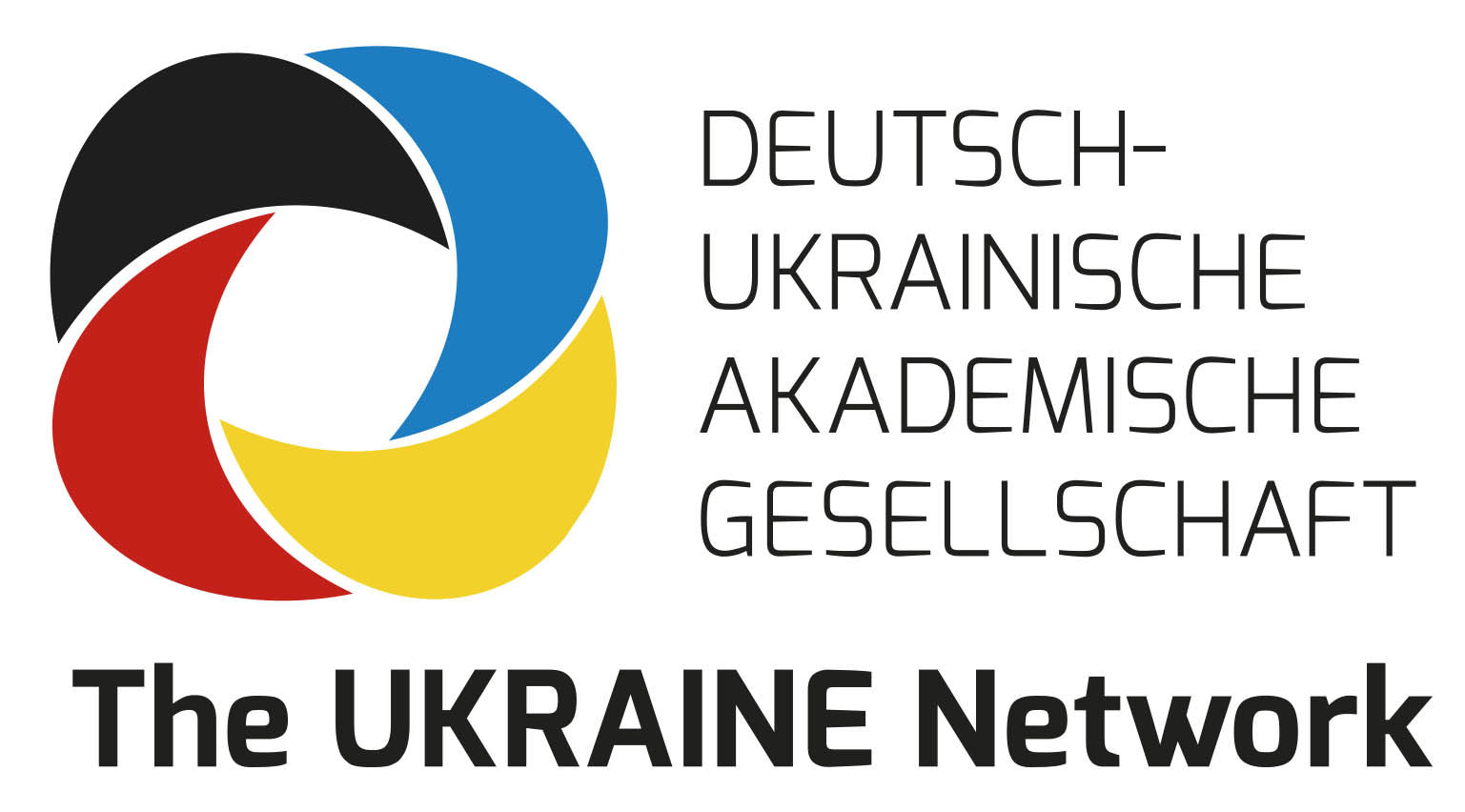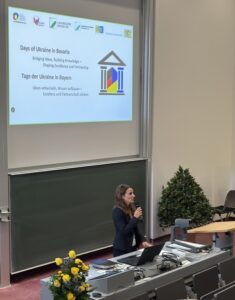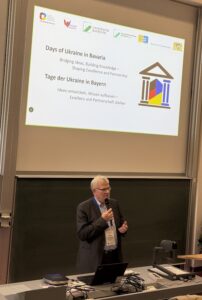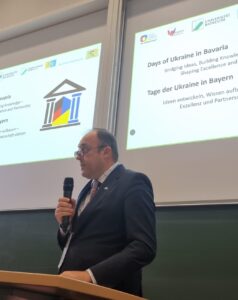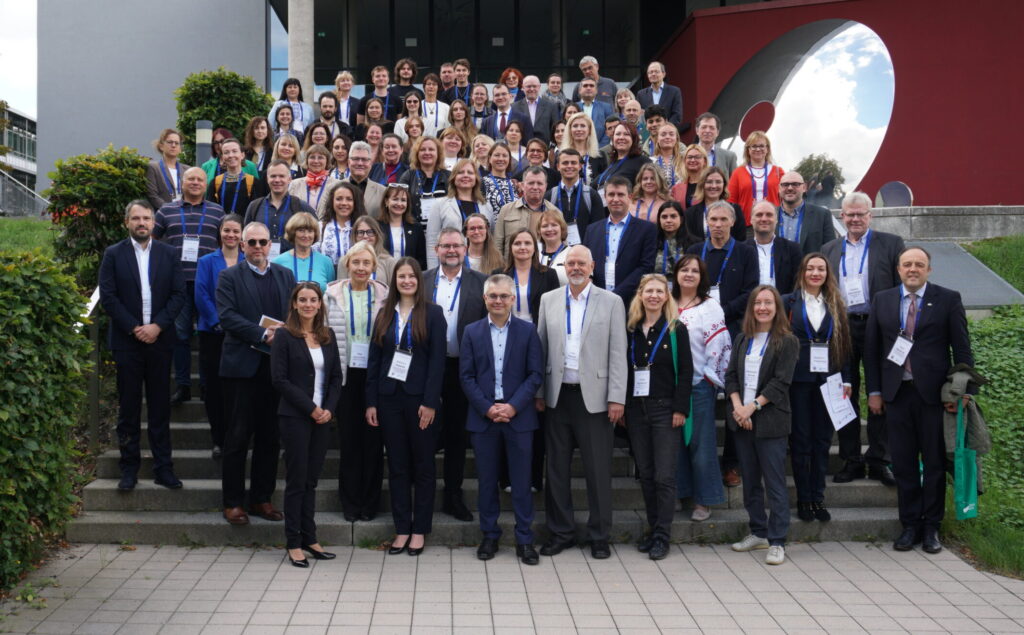
The Days of Ukraine in Bavaria, held on 1–2 October at the University of Bayreuth, continued the successful tradition of Days of Ukraine events initiated by the German-Ukrainian Academic Society (DUAG) since 2017. With the theme “Bridging Ideas, Building Knowledge – Shaping Excellence and Partnership”, this year’s event showcased the strength and diversity of German-Ukrainian academic cooperation in Bavaria and its importance in fostering excellence and innovation. Over hundred participants from Germany, Ukraine, France, the UK, Austria, the Czech Republic, Canada, and Turkey came together to discuss opportunities for cooperation with Ukraine, developing future joint projects and establishing bi- and multinational consortia. In view of the great potential for collaboration, the Days of Ukraine in Bavaria provided a platform for both established and early-career researchers to etsablish new contacts, develop new ideas, and strengthen cooperation.
Group photo: Participants of the Days of Ukraine in Bavaria. Bayreuth, 01 October 2025.
From left to right, first row: Prof. Dr. Nina Nestler, Vice President of the University of Bayreuth; Dr. Nataliya Yadzhak, University of Bayreuth; Prof. Dr.-Ing. Stefan Schafföner, Vice Dean of the Faculty of Engineering Science, University of Bayreuth; Prof. Dr.-Ing. Uwe Glatzel, University of Bayreuth; Yurii Nykytiuk, Consul General of Ukraine in Munich (first on the right). Second row: Dr. Arnim Heinemann, Director of the International Office, University of Bayreuth; Prof. Dr. Olga Garaschuk, President of the DUAG, University of Tübingen; Prof. Dr. Matthias Epple, Vice-President of the DUAG, University Duisburg-Essen; Nataliya Butych, Managing Director of the DUAG, Leibniz University Hannover; Thomas Ebersberger, Mayor of Bayreuth (first on the right), and other participants of the conference. (Copyright: Chair for Metals and Alloys, University of Bayreuth).
This year, the Days of Ukraine in Bavaria were organised by Prof. Dr.-Ing. Uwe Glatzel and Dr. Nataliya Yadzhak at the Chair of Metals and Alloys at the University of Bayreuth, supported by the Bavarian State Chancellery, Bavarian University Centre for Central, Eastern and South Eastern Europe (BAYHOST) and the Universitätsverein Bayreuth e.V. The full program of the event is accessible here.
The conference opened with welcoming addresses by Prof. Dr. Nina Nestler, Vice President for Internationalization, Gender Equality & Diversity at the University of Bayreuth; Thomas Ebersberger, Mayor of Bayreuth; Yurii Nykytiuk, Consul General of Ukraine in Munich; Prof. Dr.-Ing. Stefan Schafföner, Vice Dean of the Faculty of Engineering Science, University of Bayreuth; Prof. Dr. Olga Garaschuk, President of the German-Ukrainian Academic Society; and Prof. Dr.-Ing. Uwe Glatzel, Chair for Metals and Alloys at the University of Bayreuth. Their messages emphasized the importance of academic partnerships, scholarly distinction, and the profound impact of collaboration on Ukraine’s and Germany’s academic communities.
Welcome Session of the Days of Ukraine in Bavaria (Bayreuth, 01 October 2025):
From left to right: Prof. Dr. Nina Nestler, Vice President of the University of Bayreuth; Thomas Ebersberger, Mayor of Bayreuth; Yurii Nykytiuk, Consul General of Ukraine in Munich. (Copyright: Chair for Metals and Alloys, University of Bayreuth).
The first session “Enhancing Bilateral Academic Cooperation: Teaching, Learning, Collaborating” featured inspiring examples of cross-border partnerships. Nicolai Teufel (DAAD Lecturer, Ivan Franko National University of Lviv) traced the evolution of collaboration between Bayreuth and Ukrainian institutions since 2014. Marian Mure and Prof. Dr. Kateryna Antoniuk (TH Amberg-Weiden) shared experiences from the Competence Centre Bavaria–Central and Eastern Europe (KOMO), describing how the project’s engagement with Ukrainian partners has intensified in recent years. Prof. Dr. Sergey Dashkovskiy (University of Würzburg) presented the innovative UkrMath bachelor’s program as a successful example of a study program, with the first study phase entirely in Ukrainian. Prof. Dr. Christian Große (Technical University of Munich) concluded the session with insights into establishing a Center of Excellence for Non-Destructive Testing, emphasizing the opportunities and challenges of such international project. The following panel discussion, moderated by Dr. Nataliya Yadzhak, focused on advancing joint teaching and research from the German-Ukrainian perspective.
The afternoon session turned towards the humanities, exploring the intersections of history, migration movements, and languages. PD Dr. Julia Eichenberg (Universities of Bamberg and Bayreuth) provided an overview of German historical peace and conflict research in relation to Ukraine. Dr. Gerhard Gnauck (Ludwig Maximilian University of Munich) presented the cooperation between historians in Munich and Lviv, offering insights into the activities of the German-Ukrainian Mykola Haievoi Center for Modern History at the Catholic University in Lviv (Ukraine) and Ludwig Maximilian University in Munich (Germany), whose activities are based on four years of funding from the Federal Ministry for Research, Technology and Aeronautics (formerly BMBF) for the research project “Europe and Ukraine in the 20th Century – Soviet Rule, German Occupation and Conflicting Memories”. Ass.-Prof. Dr. Lesya Skintey (University of Innsbruck, Austria) presented the Vision Ukraїne network in the context of inter-, trans-, and post-entanglements.
The final of the annual UKRAINET PhD Thesis Presentation Contest featured six outstanding young scholars. Their research ranged from finance and biomedical science to literature, sociology, and ecology. The first prize was awarded to Sofia Kovalchuk, Department of Internal Medicine I, Hematology, Oncology, and Stem Cell Transplantation at the University Medical Center Freiburg, Germany, for presenting her PhD research entitled “Targeted inhibition of activated neutrophil transmigration ameliorates the myeloproliferative neoplasm phenotype in mice”. The second place was shared by Ruslana Koziienko, Department of Sociology and Social Anthropology at Central European University, Vienna, Austria, who presented her PhD research entitled “The Effects and Affects of the (Im)Mobility of Men During Russia’s Full-Scale War against Ukraine”, and Daria Nepochatova, Faculty of Medieval & Modern Languages, University of Oxford, UK, who presented her PhD research entitled “Ukrainian Women’s Almanacs as Nineteenth-Century Feminist Literature”.
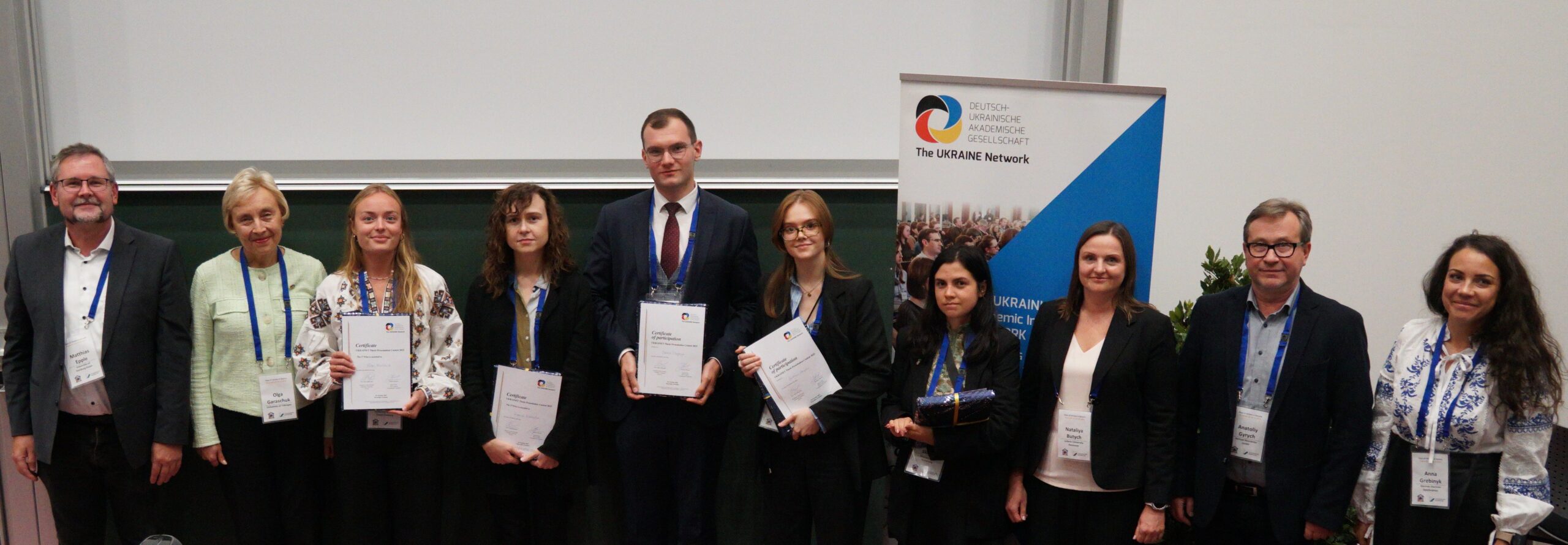
The evening keynote session addressed the German-Ukrainian Historical Dialogue in times of transformation. Prof. Dr. Jana Osterkamp (University of Augsburg) traced the transformation of German-Ukrainian dialogue in a long-term historical perspective, while Prof. Dr. Larysa Didkovska, Rector of the Ukrainian Free University (Munich), marked the 80th anniversary of the university’s developement in Munich, highlighting its historical and contemporary developments. The day closed with a festive networking dinner accompanied by bandura music by Nataliia Hrabarska and a poster session showcasing current joint German-Ukrainian research projects.
The second day began with the Annual assembly of the German-Ukrainian Academic Society, where members reviewed and discussed the society’s activities and achievements of its members, future priorities and elected a new board of the society. Nataliya Butych (Leibniz University Hannover), Prof. Dr. Olga Garaschuk (University of Tübingen), Prof. Dr. Matthias Epple (University of Duisburg-Essen), and Dr. Anna Grebinnyk (TH Wildau) were re-elected as board members for the next three years.
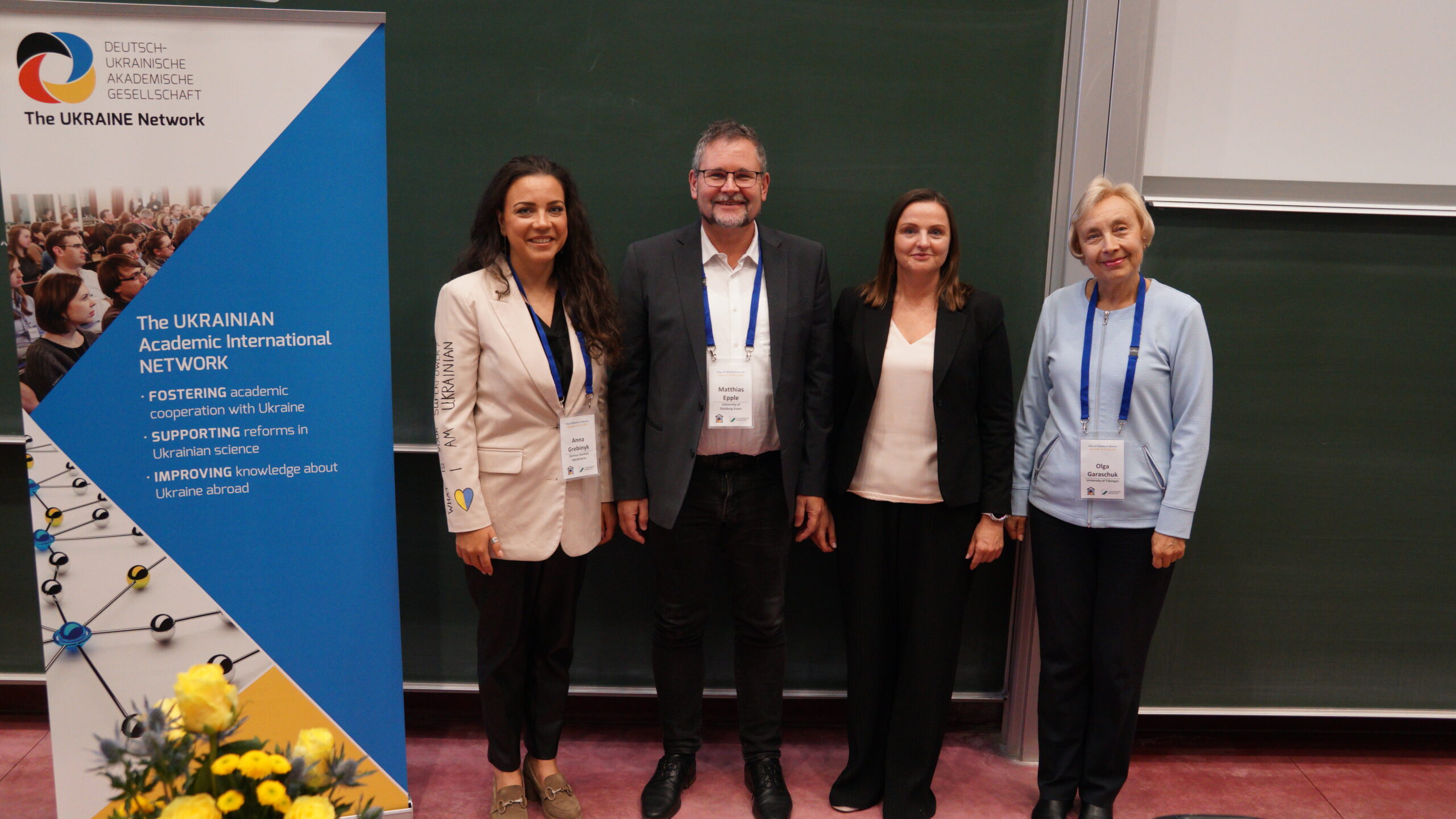
The subsequent session “German-Ukrainian Matchmaking” focused on funding instruments and opportunities for collaboration. Dr. Oksana Seumenicht, co-founder of the UKRAINE Network and the German-Ukrainian Academic Society (DUAG), emphasized fellowships as an instrument for career advancement and development of international collaborations. Nicolai Teufel (DAAD Lecturer at the Ivan Franko National University of Lviv) outlined relevant funding schemes from the German Academic Exchange Service (DAAD); Mechthild Köhler (DFG) presented the joint projects and activities with Ukrainian institutions supported by the German Research Foundation (DFG), while Olja Kovalenko (BAYHOST) provided an overview of funding opportunities for Bavarian-Ukrainian cooperation within the Bavarian University Centre for Central, Eastern and South Eastern Europe (BAYHOST). Anna Maslak (Head of the Office of the Free State of Bavaria in Ukraine) reported on the current projects of the Office of the Free State of Bavaria in Kyiv, also highlighting the associated challenges and opportunities of cooperation.
The meeting concluded with a guided tour of the Chair for Metals and Alloys, providing an insight into the work of materials scientists and serving as a starting point for further cooperation ideas.
The next Days of Ukraine are planned to take place at the TH Wildau in 2026. More information will be announced in due course.
